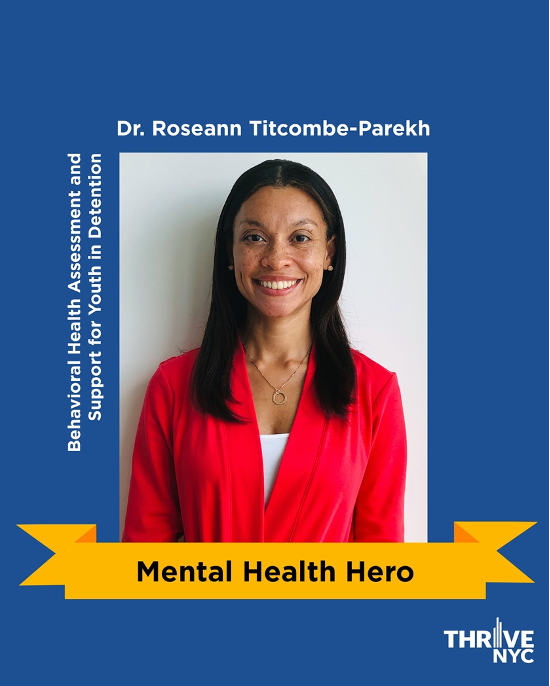Behavioral Health Assessment and Support for Youth in Detention: Jumping in without hesitation
 When Dr. Roseann Titcombe-Parekh was hired as a psychiatrist at the Rikers Island infirmary in February, she had no idea that within weeks she’d be facing an unprecedented public health crisis. Or that the crisis would dramatically change the nature of her role.
When Dr. Roseann Titcombe-Parekh was hired as a psychiatrist at the Rikers Island infirmary in February, she had no idea that within weeks she’d be facing an unprecedented public health crisis. Or that the crisis would dramatically change the nature of her role.
As the supervising psychiatrist for people with both serious mental illness and chronic medical conditions housed in the infirmary, Dr. Titcombe-Parekh was initially hired to work in a specialty housing area with individuals at elevated medical and mental health risk, and to provide support to other psychiatric providers in North Infirmary Command – but that job description quickly evolved.
As the coronavirus hit its peak in March and April, the needs of the patients and scope of the mental health service changed dramatically, and Dr. Titcombe-Parekh quickly adapted. She was reassigned from the infirmary to West Facility, where she began providing care to people diagnosed with COVID-19 who were developing a range of mental health problems. Roseann’s flexibility and courage was a source of inspiration for her team.
“We didn’t have a template or roadmap for handling COVID-19 and we didn’t know what to expect from our patients,” said Dr. Bipin Subedi, Co-Chief of Mental Health for NYC Health + Hospitals/Correctional Health Services.
“People could have had a lot of fear about working with patients who are COVID-19-positive, but not Roseann,” said Dr. Subedi. “She focused her energy on what she could do rather than what she was worried about. Even as a new hire and at a time of uncertainty, she jumped to help without any hesitation, taking responsibility for her patients and our mission to care for them.”
From Dr. Titcombe-Parekh:
“I was drawn to work in correctional psychiatry by the unique challenges and opportunities it presents. In treating our patients, we have the privilege of truly seeing, hearing, and caring for some of the most underserved and easily overlooked people in our community – this is important and fulfilling. I have an interest in understanding and treating trauma; something extremely pervasive in correctional health yet too frequently overlooked, under-appreciated, and inappropriately normalized. It is gratifying being able to treat our patients thoughtfully with the high standards of psychiatric medicine I was trained to provide, and with the humanity they deserve but so often do not receive. Though challenging at times, I am honored to commit myself to this work and humbled in doing so. I am incredibly grateful to have a team of like-minded, passionate, caring, and intelligent people to work with, who I continue to learn from.”
Related community mental health program: Behavioral Health Assessment and Support for Youth in Detention
Correctional Health Services (CHS) offers behavioral health screening, substance use engagement, and therapeutic creative arts programming for all young adults incarcerated in City jails and detention facilities. Since launching in 2016, this program has screened over 1,400 youth and young adults for behavioral health needs and provided over 5,500 creative arts therapy sessions in City jails and detention facilities. Learn more about the program and its impact here.